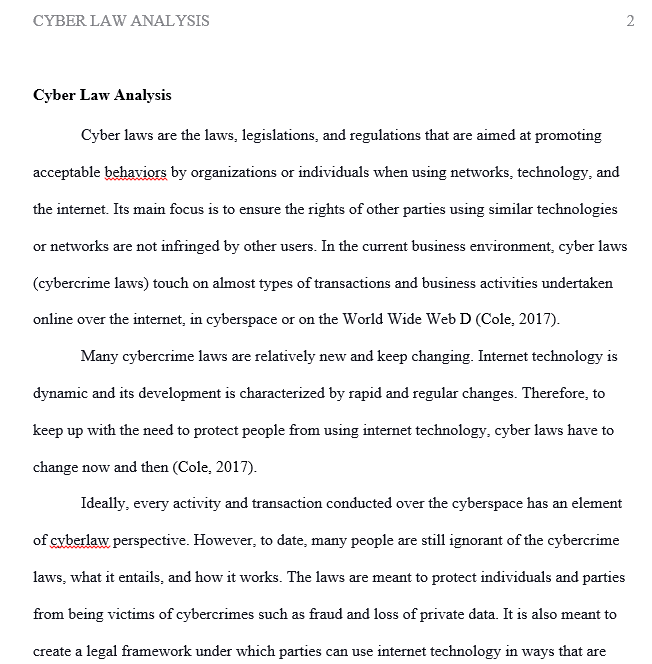The purpose of the Cyberlaw Analysis Paper is to promote student analysis of relevant and current topics that deal with cybersecurity and business concerns
Week 8 – Cyber Law Analysis Paper
The purpose of the Cyberlaw Analysis Paper is to promote student analysis of relevant and current topics that deal with cybersecurity and business concerns. From the topics provided below, you should complete a 5-7 pages long (double spaced) analysis that should dig into the topic. You should limit restating background facts of the topic and should instead focus on bringing in current research to analyze topics within current cyberlaw frameworks. You will be graded based on the rubric provided.
Topics you can choose from:
Conflicting interests of individuals in privacy as to personal data and of firms that compile such data (e.g., European data protection directive, “cookies” when visiting websites)
Protection of privacy interests in electronic transactions (e.g., anonymity and pseudonymity issues)
Spamming: rights to do or to stop?
Legal infrastructure necessary to enable electronic commerce
Regulation of cyberbanking (vis-à-vis money laundering, fraud, tax collection)
Constitutionality of mandatory key escrow systems
Challenges to the constitutionality of export control regulations as they affect the teaching of encryption algorithms (e.g., Bernstein v. United States)
Constitutionality of the Communications Decency Act (e.g., Reno v. ACLU)
Regulating fantasies on the Internet (e.g., U.S. v. Jake Baker)
Legal responsibilities vis-à-vis MUDs and MOOs
Criminal regulations of computer hackers (e.g., U.S. v. Morris, U.S. v. Riggs, U.S. v. LaMacchia)
Jurisdiction in criminal law matters (e.g., U.S. v. Thomas; Minnesota Attorney General on cybergambling)
Jurisdiction in civil law matters (e.g., Maritz, Inc. v. Cybergold, Inc.)
Cyberspace as its own jurisdiction
Dispute resolution in cyberspace (e.g., the Virtual Magistrate)
The need for new principles to resolve conflicts of laws in cyberspace
Trademark rights and domain names (e.g., MTV v. Adam Curry)
INTERNIC and the need for revision of the domain name assignment system
Universal access to the Internet
Liability of intermediate institutions, such as online service providers, for libel, other torts, and copyright infringement (e.g., Cubby v. CompuServe, Stratton-Oakmont v.
Liability of intermediate institutions for defective electronic information
Using technology to protect private or public interests (e.g., V-chip, Clipper Chip, PICS)
Electronic Communications Privacy Act (how well does it work, should it be expanded?)
Employer and employee interests vis-à-vis electronic privacy (e.g., email and websurfing)
Future of legal citations in digital networked environments
Claims of proprietary rights in electronic versions of judicial opinions and statutes
Future of legal scholarship in digital networked environments (e.g., Hibbitts’ prediction of the death of the law review)
Copyright issues arising from linking on the World Wide Web
Online service provider claims of copyright in discussions on their systems
Patent wars in cyberspace (e.g., over digital cash, rights management systems, commercial transaction systems)
Antitrust issues in cyberspace (e.g., Justice Dept. investigations of Microsoft over Internet Explorer issues)
Other relevant topic approved by the instructor in advance
Solution preview for the order on The purpose of the Cyberlaw Analysis Paper is to promote student analysis of relevant and current topics that deal with cybersecurity and business concerns
APA
1576 words
